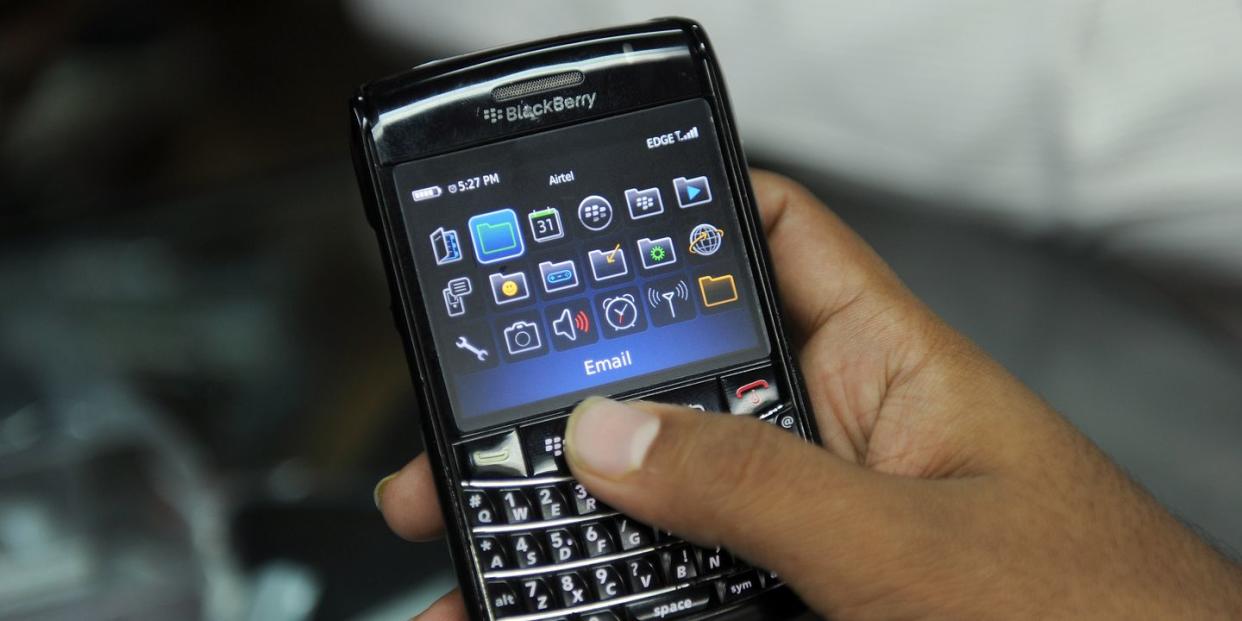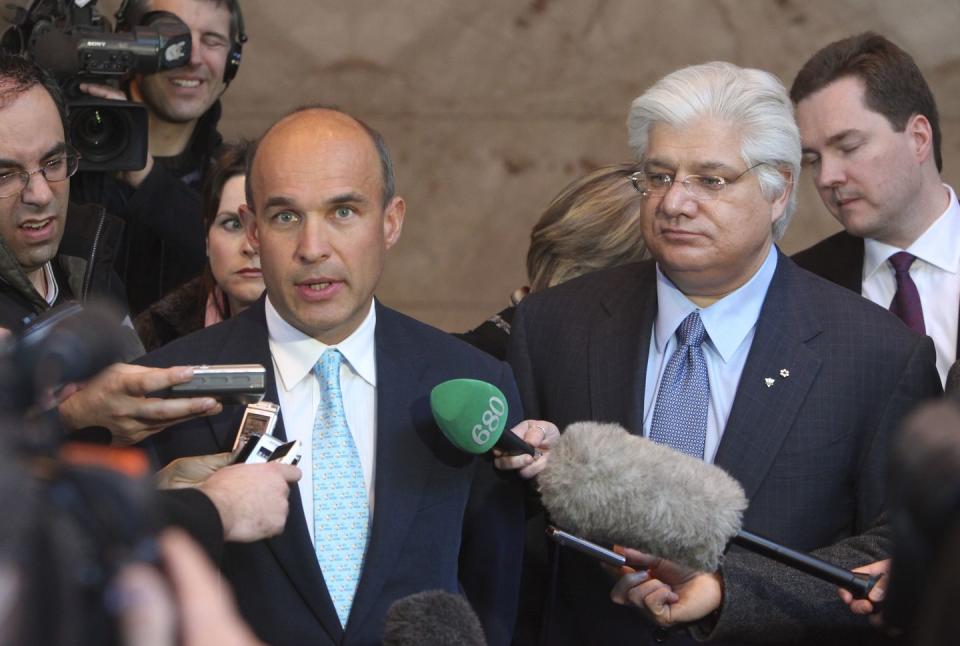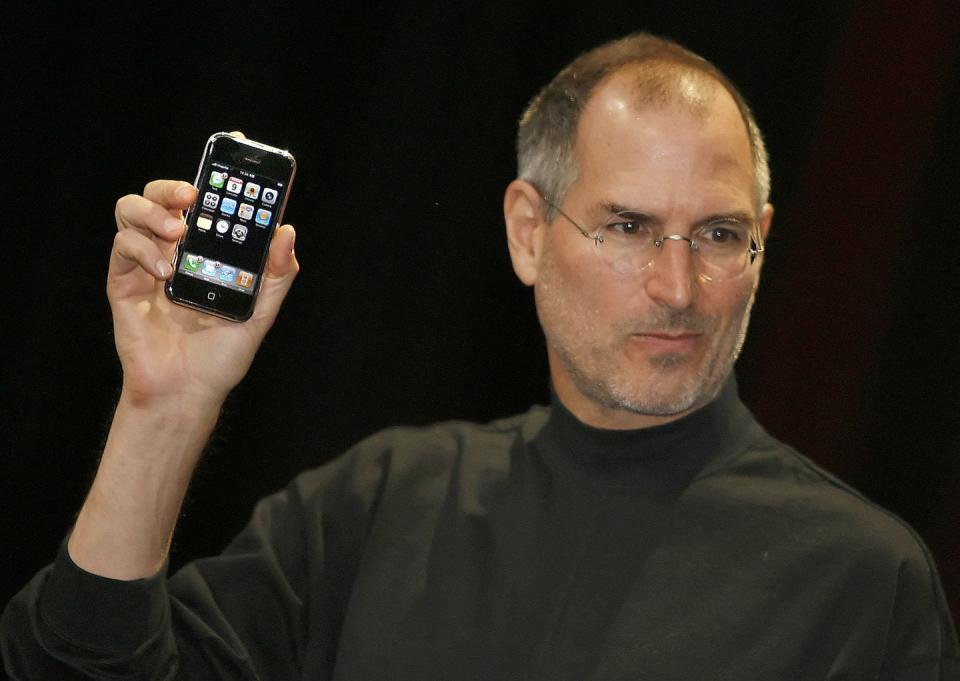The Meteoric Rise and Fall of BlackBerry and Its Inventors

- Oops!Something went wrong.Please try again later.
- Oops!Something went wrong.Please try again later.
"Hearst Magazines and Yahoo may earn commission or revenue on some items through these links."
The BlackBerry was once the king of the smartphone universe, a symbol of style and status, and a household name. But its fall was as spectacular as its rise, dropping from controlling half the world’s smartphone market in the mid-2000s, to less than 1 percent by 2015.
The new film BlackBerry chronicles the story of this once-iconic brand and focuses, in particular, on the company’s co-CEOs Mike Lazairidis and Jim Balsillie, portrayed by Jay Baruchel and Glenn Howerton, respectively. The film, which will be released on Friday, is based upon the book Losing the Signal by Jacquie McNish and Sean Silcoff.
Although Lazaridis has said little about the film, Balsillie told the Toronto Star he believes the film’s portrayal of him as a cutthroat capitalist only partially matches reality. “They’re taking an element of truth, who I am, and they’re playing with it,” he said. “I’m aggressive. I’m competitive. I’m ambitious. I own that.”
Here’s the true story of how Lazairidis and Balsillie transformed cell phones forever then lost their edge in the smartphone market.
Creating BlackBerry
The story of the BlackBerry begins in 1984, 15 years before the first smartphone bearing that name was released. That was when Mike Lazaridis and Douglas Fregin founded Research In Motion (RIM), the parent company that would be renamed BlackBerry Limited in 2013.
A Turkey-born tech investor, Lazaridis previously received a $600,000 contract from General Motors to develop barcode technology for film. That grant helped Lazaridis form RIM with Fregin, one of his childhood friends, in Waterloo, Ontario. Lazaridis became CEO, while Fregin worked as vice president of operations, according to Losing the Signal.
Balsillie, a graduate of Harvard Business School, joined RIM in 1992 after he initially considered buying the company but instead decided to invest $125,000 into it. RIM had only 14 employees when Balsillie joined. He became co-CEO, handling sales and accounting, while fellow co-CEO Lazaridis focused on the technological aspect of the business.

“Balsillie became the BlackBerry’s best salesman, winning customers in the financial services industry and with security-conscious governments around the world,” Technology Reporter Iain Marlow wrote in The Globe and Mail. “Under his reign, the company grew at a breakneck speed—smashing internal targets regularly and overturning the wireless world’s established hierarchy.”
However, Marlow noted that Balsillie was “feared as well as respected.” People who disagreed with his views on the fast-growing smartphone industry were “swiftly, and sometimes mercilessly, put in their place,” and his critics accused him of bringing an “institutional arrogance” to RIM’s company culture.
Bursting onto the Scene
The first device with the BlackBerry name was a pager released in 1999 called the BlackBerry 850. The pager, like the better-known smartphones that came after it, was particularly notable for its keypad that users could operate via thumbs. The name BlackBerry derived from this keypad, since the globe-shaped buttons resembled blackberry fruits.
The company’s first smartphone, the BlackBerry 5810, was launched in 2002. Initially targeted toward businesspeople rather than general users, its technological capabilities and stylish look made it a hit among investment bankers and other professionals. BlackBerry quickly became a household name, gaining the nickname “CrackBerry” due to its addictive nature.
The company grew from 14 employees to about 18,000 and continued to release new versions of the BlackBerry smartphone, upgrading the monochrome screen to color displays. The products remained popular, though the company struggled to meet revenue targets, and business suffered after the patent holding company NTP filed patent infringement lawsuits against BlackBerry.
The company’s reputation was further damaged after an extensive review found more than $250 million in stock option accounting errors. As a result, Balsillie resigned his role as chairman of RIM in 2007, though he remained co-CEO. The company leaders paid $1.4 million in fines in 2009 as part of a settlement with regulators.
Balsillie said the BlackBerry film portrays him as having engaged in stock fraud based upon this incident. He objected to that interpretation, noting that regulators said RIM executives were negligent with the stock options, not that they committed fraud.
Failing to Compete
The true death knell for BlackBerry, however, was the launch of iPhones and Android phones in 2007 and 2008. BlackBerry was left behind as those new products revolutionized the smartphone industry with touchscreen displays and third-party apps.

Losing the Signal portrays BlackBerry executives as underestimating the threat posed by Steve Jobs’ famous launch of the iPhone in 2007. BlackBerry COO Larry Conlee dismissed it as having “rapid battery drain and a lousy [digital] keyboard,” according to the book. Although Lazaridis voiced concerns about Apple, Balsillie simply responded, “It’s OK, we’ll be fine.”
Initially, it appeared his confidence was well-placed, the BlackBerry Curve remained the highest-selling phone of 2009. But the company soon found itself unable to compete with the iPhone and Android devices. RIM ultimately became a software and cybersecurity company, though it did not completely discontinue its smartphone services until 2022.
The BlackBerry film also highlights Balsillie’s failed attempts to bring a NHL hockey team to Hamilton, Ontario, which critics have suggested distracted RIM from the threat posed by their new competition. Balsillie denies this, saying that effort only required occasional meetings and phone calls: “When you are prosperous, you have lots of different initiatives. Everybody does.”
Other observers have argued the co-CEO structure split between Balsillie and Lazaridis hastened the company’s demise. The two were barely on speaking terms by the end of their professional relationship, and the dual-executive structure led to breakdowns in the decision-making process, according to The Globe and Mail.
“Part of the challenge was RIM started to develop arrogance, and that arrogance came from success—and I’m going to say that impacted Jim a lot more than Mike,” an unnamed source told the newspaper. “In time, he stopped listening. Because you’re a billionaire, and you know more than everybody else, so you like to hear yourself speak but not like to listen or take any feedback.”
Stepping Down from BlackBerry
Balsillie stepped down as co-CEO in 2012, and the next year, he sold all his shares in the company, effectively severing ties with BlackBerry. After departing from the company, he began advising various venture capital firms and startups, including OMERS Ventures and the mobile health company m-Health Solutions, according to The Globe and Mail.
Lazaridis also resigned in 2012 and was replaced by RIM COO Thorsten Heins. The next year, Lazaridis and Fregin co-founded Quantum Valley Investments, a private fund seeking to support for the development and commercialization of breakthroughs in quantum information science.
How much of their legacies are shaped and defined by the new BlackBerry film remains to be seen. In an interview with The Verge, director Matt Johnson describes Lazaridis and Balsillie as innovators but says the BlackBerry smartphone failed because it lacked a vision of culture and future like the iPhone had.
“The iPhone is a product with incredible vision, and it’s saying that you are going to change the way that you live in order to make this product integrate with you,” Johnson said. “Whereas the BlackBerry was, ‘We’re going to give you this tool that is going to help you with the tiny problems that you have, and it’s going to be very, very useful.’”
See BlackBerry in Theaters on May 12
BlackBerry opens in theaters on Friday. Jay Baruchel stars as company co-CEO Mike Lazairidis, and Glenn Howerton plays co-CEO Jim Balsillie. The film’s director, Matt Johnson, also appears on screen as Research In Motion co-founder Douglas Fregin.

